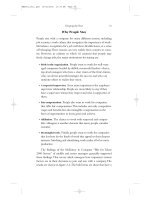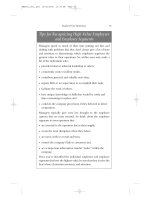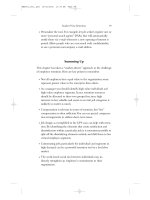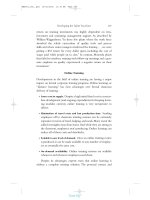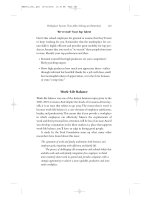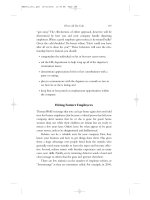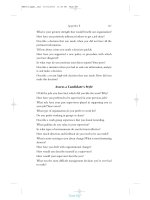Hiring and Keeping the Best People 12
Bạn đang xem bản rút gọn của tài liệu. Xem và tải ngay bản đầy đủ của tài liệu tại đây (129.94 KB, 8 trang )
Why People Stay
People stay with a company for many different reasons, including
job security, a work culture that recognizes the importance of work-
life balance, recognition for a job well done, flexible hours, or a sense
of belonging.These reasons can vary widely from country to coun-
try. However, in cultures in which it’s assumed that people may
freely change jobs, the major motivations for staying are:
•
Pride in the organization.
People want to work for well-man-
aged companies headed by skilled, resourceful leaders—that is,
top-level managers who have a clear vision of the firm’s future,
who can devise powerful strategies for success, and who can
motivate others to realize that vision.
•
A respected supervisor.
Even more important is the employee-
supervisor relationship. People are more likely to stay if they
have a supervisor whom they respect and who is supportive of
them.
•
Fair compensation.
People also want to work for companies
that offer fair compensation.This includes not only competitive
wages and benefits but also intangible compensation in the
form of opportunities to learn, grow, and achieve.
•
Affiliation.
The chance to work with respected and compat-
ible colleagues is another element that many people consider
essential.
•
Meaningful work.
Finally, people want to work for companies
that let them do the kinds of work that appeal to their deepest
interests. Satisfying and stimulating work makes all of us more
productive.
The findings of the McKinsey & Company “War for Talent
2000 Survey” of middle and senior managers generally supported
these findings. That survey asked managers how important various
factors are in their decisions to join and stay with a company. The
results are shown in figure 3-3.The bold items are those that have a
Keeping the Best 75
HBE001_ch3_.qxd 10/02/2002 11:34 AM Page 75
strong causal relationship with the overall level of reported satisfac-
tion. Authors Ed Michaels, Helen Handfield-Jones, and Beth Axel-
rod make a case from these and other findings that companies can
attract and retain talented people if they pay attention to what they
term the “employee value proposition,” or EVP. EVP is the work-
place equivalent to the value proposition that every company know-
76 Hiring and Keeping the Best People
FIGURE 3-3
What Managers Are Looking For
% of respondents who rate the item critical in their decision of which company to join
and stay with
Great company
Company is well managed 48%
Good relations with my boss 43%
I like the culture and values 39%
I trust senior management 38%
Not hampered by bureaucracy 30%
A boss I admire 26%
Exciting, interesting industry 24%
Industry has growth prospects 22%
Products make a difference 21%
Company is a strong performer 21%
People are high performers 19%
Company’s reputation 17%
Camaraderie with colleagues 13%
Contribution beyond
the bottom line 9%
People with diverse
backgrounds 8%
Positive impact on society 6%
Wealth and rewards
Recognized, rewarded for
my individual contribution 39%
Substantial wealth creation
opportunity 36%
High performers paid more 31%
Annual cash comp is high 26%
✓
✓
✓
✓
✓
✓
✓
✓
✓
Exciting work
Interesting, challenging work 59%
Work I feel passionate about 45%
I am listened to and can
impact decisions 41%
Take initiative and own success 40%
Have impact in the company 35%
Freedom and autonomy 31%
Participate in strategic directions 22%
Encouraged to innovate 22%
Development
Career advancement
opportunities 37%
Long-term commitment to me 35%
Build skills to boost career 35%
Sr. managers committed to me 30%
High performers promoted 28%
Frequent feedback 17%
Receive helpful mentoring 16%
Ongoing training 14%
Lifestyle
Can meet my personal/family
commitments 51%
Live in appealing city/region 34%
Reasonable work pace 11%
Flexibility of when/where I work 9%
✓
✓
✓
✓
✓
✓
✓
Source: McKinsey & Company War for Talent 2000 Survey, reprinted with permission.
Bolded = items that make up the elements that have a strong causal relationship with satisfaction
✓
HBE001_ch3_.qxd 10/02/2002 11:34 AM Page 76
Keeping the Best 77
ingly or unknowingly offers its customers: a measure of perceived
value for a particular cost.They suggest that if companies want to be
more successful at attracting and retaining talent, they should evalu-
ate and strengthen their value propositions to employees:
To create a compelling employee value proposition, a company must
provide the core elements that managers look for—exciting work, a
great company, attractive compensation, and opportunities to develop.A
few more perks, casual dress, or more generous health plans won’t make
the difference between a weak EVP and a strong one. If you want to
substantially strengthen your company’s EVP, be prepared to change
things as fundamental as the business strategy, the organization struc-
ture, the culture, and even the caliber of leaders.
7
Though the data on which Michaels et al. base their conclusions
focused on managers and executives, it’s likely that other employees
will respond similarly.
Why People Leave
People also leave organizations for many different reasons, but pri-
marily because one or more of the above conditions was either
absent at the beginning or has since been eliminated. For example:
•
The company’s leadership shifts.
Either the quality of top
management’s decisions declines, or new leaders—whom
employees don’t yet trust or feel comfortable with—take the
helm.
•
Conflict with immediate supervisors.
People may also leave
when their relationship with their bosses becomes stressful or
problematic, and they don’t see any other options in their
company. (See “Managers and Supervisors Are Key” for more
on this topic.)
•
Close friends leave.
One or more colleagues whom an
employee particularly likes and respects leave the firm, thus
taking away an affiliation that is very meaningful to that
employee.
HBE001_ch3_.qxd 10/02/2002 11:34 AM Page 77
TEAMFLY
Team-Fly
®
78 Hiring and Keeping the Best People
You can have terrific pay and benefits, employee-friendly poli-
cies, and all the other things that induce loyalty and retention,
but a few rotten apples can spoil the barrel. Specifically, a bad
manager can neutralize every retention scheme you put in place.
Gallup researchers Marcus Buckingham and Curt Coffman put
it this way:
Managers trump companies. It’s not that . . . employee-focused ini-
tiatives are unimportant. It’s just that your immediate manager is
more important. She defines and pervades your work environ-
ment. . . . [I]f your relationship with your manager is fractured,
then no amount of in-chair massaging or company-sponsored dog
walking will persuade you to stay and perform. It is better to work
for a great manager in an old-fashioned company than for a terrible
manager in a company offering an enlightened, company-focused
culture.
a
Beth Axelrod, Helen Handfield-Jones, and Ed Michaels of McK-
insey & Company reached a similar conclusion about bad man-
agers, which they describe as “C performers.”“[K]eeping C per-
formers in leadership positions lowers the bar for everyone—a
clear danger for any company that wants to create a perform-
ance-focused culture. C performers hire other C performers, and
their continued presence discourages the people around them,
makes the company a less attractive place for highly talented
people, and calls in question the judgment of senior leaders.”
b
(We have more on C performers and how to handle them in a
later chapter.)
While many say that the company culture is what matters in
retention, the culture of operating units is what really matters to
the people who work in them. If the boss is a jerk or an incom-
petent, the best people will leave.
Managers and Supervisors Are Key
a
Marcus Buckingham and Curt Coffman,First,Break at the Rules (New York:Simon & Schuster,1999),34.
b
Beth Axelrod, Helen Handfield-Jones,and Ed Michaels,“A New Game for C Players,” Harvard Business
Review 80, no. 1 (January 2002): 83.
HBE001_ch3_.qxd 10/02/2002 11:34 AM Page 78
•
An unfavorable change of responsibilities.
A person’s job
responsibilities change so that the work no longer appeals to his
or her deepest interests or provides meaning or stimulation.
Perhaps the number-one point to keep in mind when thinking
about why people leave is this: People most often leave for the
wrong reasons.That is, they leave without really understanding why
they’re unhappy or what opportunities to improve things may exist
within the company. Thus they jump from company to company,
making the same mistake each time. Consider this example:
An engineer is promoted to a managerial position because he’s a high
performer and has been with the company for a while.This person may
not even like being a manager. But because he hasn’t yet identified his
deepest work interests, he doesn’t make the connection between his new
role and his unhappiness. Instead, he concludes that he just doesn’t like
the company anymore—and starts looking for another job.
Unfortunately, when he finds another job outside the company, it’ll
likely be another managerial position. He’ll work at that job for a
while before realizing that he’s still unhappy—at which point he will
decide that the new company, too, is a bad fit for him.
Mid-level managers seem to repeat this pattern more than any
other employee group.
Two Retention Champions
Most people recognize Southwest Airlines as a highly successful
company. In an industry plagued by strikes, desperate mergers, and
buckets of red ink,Texas-based SWA boasts thirty consecutive prof-
itable years—something that no other major airline can do. Less
well-known is the fact that SWA’s employee turnover rate is just
over 4 percent, half that of its competitors. People who sign on as
SWA employees clearly like their jobs and stick around, cutting the
company’s recruiting and training costs. And high employee morale
rubs off on customers, making them satisfied and loyal users.
SWA’s strong relationship with its employees is the legacy of
Herb Kelleher, who created an employee-focused workplace based
Keeping the Best 79
HBE001_ch3_.qxd 10/02/2002 11:34 AM Page 79
